Wind Damage Claims
High-velocity winds can cause severe damage to your property. Common windstorm claims involve roofs blowing off, trees falling on your property, fences blown down, and leaky windows. This type of damage can also bring hidden damages that aren’t realized upon the initial assessment of your property.
Damage caused by wind is covered in most homeowners insurance policies, however there can be ambiguous exclusions or limitations which may cause your claim to be denied. Merlin Law Group has handled many wind damage claims and helps policyholders recover what is rightfully owed. Contact Merlin Law Group if your insurance claim has been delayed or denied.
Get a free case review
Free Case ReviewWind Damage FAQs
Our Wind Damage Claim Attorneys Are Here To Answer Your Questions
- You should photograph any damages to your property as soon as possible after the peril. If you can prepare for any potential damaging winds, having “before” photos is helpful in building out a strong claim.
- You should address any and all damages to your property. Keep an eye out for any exposed entryways or another potential sources for further damage as a result of wind hitting your property. Temporary repairs may be necessary to address these. If you make any repairs, be sure to track any expenses toward them.
- File your claim as soon as possible. Upon filing your claim there will likely be an insurance representative or independent adjuster coming out to assess the damage to your property. Be sure to keep track of any correspondence between you and your insurance company, including written damage assessment reports.
- Consider hiring a public adjuster or damage assessment expert to look at any windstorm damage. It is recommended you obtain a second opinion, as a public adjuster’s estimate may differ from the independent adjuster. An outside opinion could lead to more money for your claim.
Wind damage is generally covered under homeowners insurance policies, unless you live near the coast. We recommend you review your insurance policy to confirm that wind is noted as a covered peril, if your policy is “all-risk,” or if there is any explanation for windstorms. If it is not covered, consider modifying your policy or obtaining supplemental coverage through another insurer.
If your policy covers wind damage, there are two primary types of protection to look for regarding your property. The first is dwelling coverage, which protects your home’s structure. Dwelling coverage assists with repairs to your home’s roof, windows, or siding, for example.
The other primary protection to look for in your policy is personal property coverage. This assists with the cost of replacing any personal contents damaged by wind within your home’s structure. Bear in mind that each protection type may carry a limit regarding the amount your insurer will cover.
If wind damage is covered under your policy a deductible will typically apply. A deductible is the amount you pay out of pocket toward damage or a loss prior to the insurance company paying for a claim. You can find your deductibles outlined in your homeowners insurance policy declaration page. There may be an option to adjust the amount of your deductibles to better fit your needs.
Coverage limits apply to each type of coverage in your policy. If your policy covers wind damage, for example, it will only pay up to the limit you selected when you purchased the policy. As with your deductibles, coverage limits can be adjusted to align with your current needs.
There can be many different exclusions laid out in your policy. A common exclusion arises with determining whether the damage in question was caused by wind. Insurers may argue that damage is excluded because they consider it a result of wear and tear, defect, improper maintenance, or improper repairs as opposed to wind. This is where a public adjuster’s assessment of the damage may help.
Insurance policies often contain something known as anti-concurrent causation clauses. These clauses say when two perils occur simultaneously and the homeowner is only covered for one, the insurer will not cover the damage.
For example, if you file a wind damage claim but your property also sustained water damage your insurer could deny the claim on the grounds that water damage is excluded from your policy. Supplemental coverage can help with avoiding this type of situation. We recommend reviewing your policy to pinpoint any anti-concurrent causation clauses that exist.
With offices located nationwide, we have an experienced insurance claim attorney near you. View our directory of attorneys and practicing states here.
Hear What Our Clients Are Saying
Why Choose Merlin Law Group?
Founded in 1985, our law firm continues to be dedicated to representing insurance policyholders throughout the United States. Collectively, our lawyers are licensed to practice in 22 states. In fact, many of Merlin Law Group’s attorneys worked for the insurance industry before joining the firm, so they bring a strong understanding of insurance company practices.
Anyone can file a claim, but it takes experience, knowledge, and savvy to achieve a truly successful outcome. As The Policyholder’s Advocate®, Merlin Law Group aims to drive positive change within the insurance sector by obtaining justice for our clients and educating policyholders on how to navigate insurer bad faith tactics.
Submit A Free Case Review
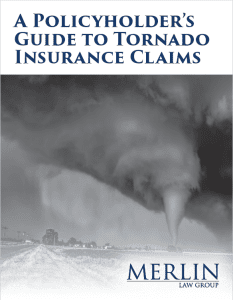
A Policyholders Guide to Tornado Insurance Claims
Tornadoes are terrifying events. They can strike out of the blue with barely any warning. With all the meteorological advancements that have been made in the last 50 years, National Weather Service tornado warning times are still, on average, a mere 10 to 15 minutes in advance.
Download eBook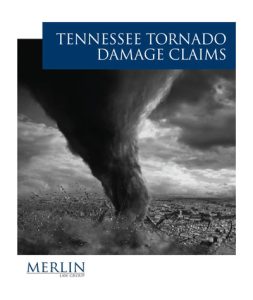
Tennessee Tornado Damage Claims
Incredibly powerful tornadoes recently swept through multiple counties in Tennessee. Hundreds of homes and buildings were destroyed, precious lives were lost, and communities forever changed.
Download eBook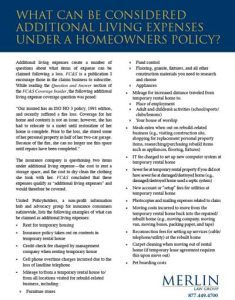
What Can Be Considered Additional Living Expenses Under a Homeowners Insurance Policy?
Additional living expenses create a number of questions about what items of expanse can be claimed following a loss. FC&S is a publication I encourage those in the claims business to subscribe.
Download eBook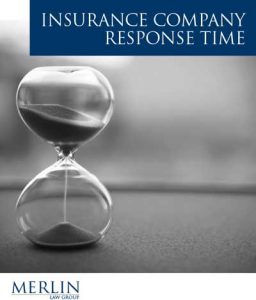
Insurance Company Response Time
When your home or business suffers damage due to a natural disaster, your life can change quickly. Insurance companies are there to help you through this peril, but the wait between the disaster and getting back to normal can be agonizing.
Download eBook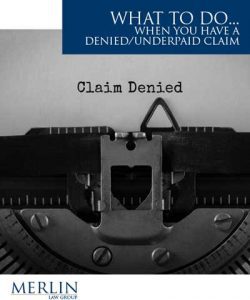
What to Do When You Have a Denied/Underpaid Claim
Having your property insurance claim denied is not the end of the road. Unfortunately, it is the last thing you want to hear after a disaster leaves your home or business damaged, but it is merely another step in the process towards recovery.
Download eBook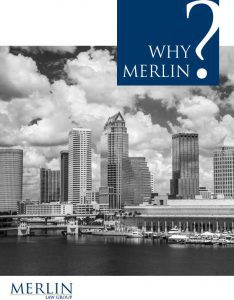
Why Merlin?
Since 1985, Merlin Law Group has aided policyholders achieve recovery with their property insurance claims. We have created an eBook detailing what Merlin can bring to the table in terms of legal representation. Don’t let insurance companies lead you to a second disaster — allow Merlin Law Group to help!
Download eBook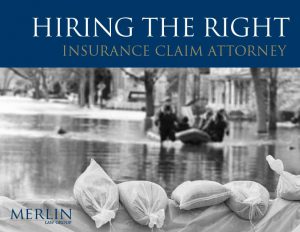
Hiring The Right Insurance Attorney
It is important you find an attorney that will be aggressive in obtaining justice for you. Merlin Law Group’s attorneys have the experience and skillset required to help policyholders receive their entitled coverage benefits. Check out our eBook on what to look for in a property insurance attorney to see if we would be a good fit for you.
Download eBook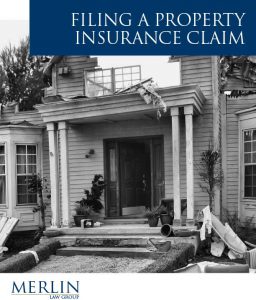
Filing A Property Insurance Claim
Filing a property insurance claim can be confusing if you have never had to do it before. We created this helpful asset outlining the process.
Download eBook